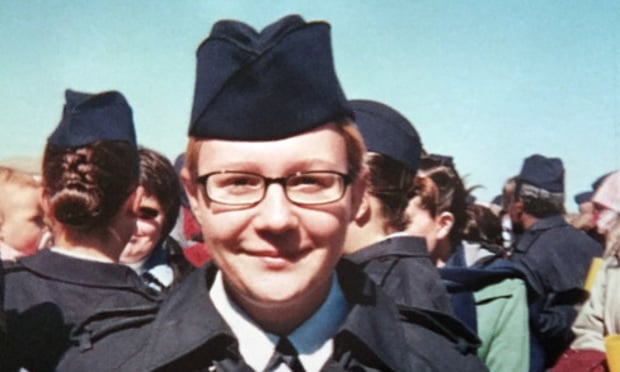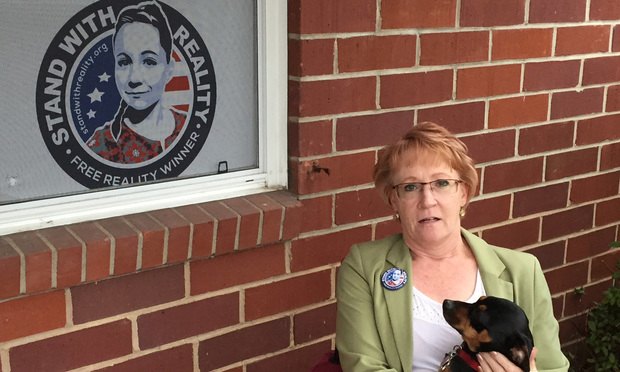Reporters Committee Protests Ban on Media Interviews With Reality Winner
A lawyer for the RCFP is urging a prison warden to reverse a decision barring Winner from doing media interviews.
May 31, 2019 at 10:21 AM
6 minute read
 Reality Winner
Reality Winner
The Reporters Committee for Freedom of the Press is protesting a decision by a Texas federal prison warden to bar journalists from interviewing incarcerated U.S. Air Force veteran Reality Winner.
In a May 29 letter to Warden Jody Upton at the Federal Medical Center in Fort Worth, Texas, Reporters Committee for Freedom of the Press legal director Katie Townsend asked Upton to reconsider his decision to bar CNN and a documentary filmmaker from interviewing Winner. The committee is a nonprofit organization headquartered in Washington, D.C., that offers legal support to the news media.
Upton forbade interviews with Winner despite what Townsend said were “efforts to accommodate any concerns” involving either equipment or the number of people who would be present to film the interviews, Townsend said.
The warden denied the interview requests even though U.S. Bureau of Prisons policies allow for media interviews with inmates in many circumstances. Reasons for denying an interview include a failure to secure the appropriate approvals or meet specific conditions set by the warden, or interviews that “in the opinion of the warden, would endanger the health or safety of the interviewer, or would probably cause serious unrest or disturb the good order of the institution.”
Winner, 26, who worked for a National Security Agency contractor when she was arrested in June 2017, is serving a 63-month sentence for leaking a document to The Intercept in 2017 that outlined how Russian hackers attempted to penetrate state election systems in the months leading up to the 2016 election.
The Intercept story was published at a time when President Donald Trump rejected any suggestion that Russian hackers tried to interfere with the 2016 election. It also came nearly two years before Special Counsel Robert Mueller III released his report detailing Russian interference.
On Thursday, a spokesman for the Bureau of Prisons regional office in Texas said Upton retired April 30. Spokesman Jeff Baney said he was aware of Townsend's letter and that staff at FMC-Carswell, where Winner is housed, were preparing a statement in response. It has not yet been released.
On Friday, the Bureau of Prisons public affairs office in Washington, D.C. said the BOP will respond to the committee's letter but provided no other information as to the nature or timing of the intended response.
“The decision regarding granting interviews or filming an inmate interview is based upon whether the requested access poses any risk to the safety of inmates, staff or the public,” an unidentified bureau representative said in an email to a reporter.
The BOP said all media requests are reviewed on “a case-by-case basis,” and the final decision about whether to allow an interview and the interview terms is made by each prison warden “based on his or her direct knowledge of the particular risks associated with the request.”
Winner was the first person prosecuted by the Trump administration for leaking classified government information to a news outlet. Her arrest was touted by then-U.S. Attorney General Jeff Sessions as a warning to other would-be leakers.
When Winner pleaded guilty last June, federal prosecutors said her 63-month sentence was the longest handed down against a federal defendant for an unauthorized disclosure to the press. Prosecutors insisted that she plead guilty to violating the federal Espionage Act, which is intended for violators who steal military secrets and turn them over to the nation's enemies.
Federal prosecutors offered Winner the plea deal after a federal judge in Augusta said he would permit the nation's former “classification czar,” William Leonard, to testify on Winner's behalf about whether the leaked information was truly classified as the government claimed, and whether there was any harm associated with its release.
The Justice Department announced Winner's arrest the same day The Intercept published an article based on a leaked NSA report that Russian intelligence operatives attempted to penetrate computers of state and local election officials and the private software companies that service the nation's voting infrastructure before the 2016 election, including in Florida and Georgia.
Much of the information contained in the five-page document Winner leaked was later published in two pending federal indictments of 26 Russian military operatives and Russian nationals on charges they interfered with the 2016 presidential election.
Townsend said in her letter that a “fundamental element of news gathering” is the ability to conduct and record on-the-record interviews that “provide the most accurate and credible material for a news story and can be vital to the public's understanding of something as complex and important as the criminal justice system or, in the specific case here, a prosecution under the Espionage Act.”
Townsend also cited the American Bar Association's prisoner treatment standard, which says journalists should be permitted to visit prisons and interview inmates.
Winner's Atlanta attorney, Baker, Donelson, Bearman, Caldwell & Berkowitz partner Joe Whitley, said Thursday he was not aware that Winner was blocked from giving media interviews. “I support her having the opportunity to speak to the media … as long as her comments were consistent with the plea agreement,” he said. Whitley also said he hoped prison officials would reconsider the media ban.
 Billy Winner-Davis with Dobby. Photo: R. Robin McDonald/ALM
Billy Winner-Davis with Dobby. Photo: R. Robin McDonald/ALMWinner's mother, Billie Winner-Davis, said Thursday that she didn't contact the Reporters Committee but has read Townsend's letter. “They make a good point,” Winner-Davis said. Her daughter “has been told she is not allowed to have any journalists or media on her contact list at all. It's forbidden,” she said. “They have Reality really scared.”
Winner-Davis says her daughter is a whistleblower and a patriot, not a spy.
“The public has a right to know who Reality is,” she said. “I can't think of any reason why Reality can't be interviewed and the world can't know who Reality is. From Day One they have silenced her, and I don't understand it. They don't want people to get to know her. They don't want her to get publicity. They don't want her story out there.”
Read more:
This content has been archived. It is available through our partners, LexisNexis® and Bloomberg Law.
To view this content, please continue to their sites.
Not a Lexis Subscriber?
Subscribe Now
Not a Bloomberg Law Subscriber?
Subscribe Now
NOT FOR REPRINT
© 2025 ALM Global, LLC, All Rights Reserved. Request academic re-use from www.copyright.com. All other uses, submit a request to [email protected]. For more information visit Asset & Logo Licensing.
You Might Like
View All

A Look Back at High-Profile Hires in Big Law From Federal Government
4 minute read

Trending Stories
- 1FTC Sues PepsiCo for Alleged Price Break to Big-Box Retailer, Incurs Holyoak's Wrath
- 2Greenberg Traurig Litigation Co-Chair Returning After Three Years as US Attorney
- 3DC Circuit Rejects Jan. 6 Defendants’ Claim That Pepper Spray Isn't Dangerous Weapon
- 4Quiet Retirement Meets Resounding Win: Quinn Emanuel Name Partner Kathleen Sullivan's Vimeo Victory
- 5Balancing Hybrid Work With Relationship Building, Newly Merged Ballard Spahr Prioritizes 'Coaching Aspect' of Training New Associates
Who Got The Work
J. Brugh Lower of Gibbons has entered an appearance for industrial equipment supplier Devco Corporation in a pending trademark infringement lawsuit. The suit, accusing the defendant of selling knock-off Graco products, was filed Dec. 18 in New Jersey District Court by Rivkin Radler on behalf of Graco Inc. and Graco Minnesota. The case, assigned to U.S. District Judge Zahid N. Quraishi, is 3:24-cv-11294, Graco Inc. et al v. Devco Corporation.
Who Got The Work
Rebecca Maller-Stein and Kent A. Yalowitz of Arnold & Porter Kaye Scholer have entered their appearances for Hanaco Venture Capital and its executives, Lior Prosor and David Frankel, in a pending securities lawsuit. The action, filed on Dec. 24 in New York Southern District Court by Zell, Aron & Co. on behalf of Goldeneye Advisors, accuses the defendants of negligently and fraudulently managing the plaintiff's $1 million investment. The case, assigned to U.S. District Judge Vernon S. Broderick, is 1:24-cv-09918, Goldeneye Advisors, LLC v. Hanaco Venture Capital, Ltd. et al.
Who Got The Work
Attorneys from A&O Shearman has stepped in as defense counsel for Toronto-Dominion Bank and other defendants in a pending securities class action. The suit, filed Dec. 11 in New York Southern District Court by Bleichmar Fonti & Auld, accuses the defendants of concealing the bank's 'pervasive' deficiencies in regards to its compliance with the Bank Secrecy Act and the quality of its anti-money laundering controls. The case, assigned to U.S. District Judge Arun Subramanian, is 1:24-cv-09445, Gonzalez v. The Toronto-Dominion Bank et al.
Who Got The Work
Crown Castle International, a Pennsylvania company providing shared communications infrastructure, has turned to Luke D. Wolf of Gordon Rees Scully Mansukhani to fend off a pending breach-of-contract lawsuit. The court action, filed Nov. 25 in Michigan Eastern District Court by Hooper Hathaway PC on behalf of The Town Residences LLC, accuses Crown Castle of failing to transfer approximately $30,000 in utility payments from T-Mobile in breach of a roof-top lease and assignment agreement. The case, assigned to U.S. District Judge Susan K. Declercq, is 2:24-cv-13131, The Town Residences LLC v. T-Mobile US, Inc. et al.
Who Got The Work
Wilfred P. Coronato and Daniel M. Schwartz of McCarter & English have stepped in as defense counsel to Electrolux Home Products Inc. in a pending product liability lawsuit. The court action, filed Nov. 26 in New York Eastern District Court by Poulos Lopiccolo PC and Nagel Rice LLP on behalf of David Stern, alleges that the defendant's refrigerators’ drawers and shelving repeatedly break and fall apart within months after purchase. The case, assigned to U.S. District Judge Joan M. Azrack, is 2:24-cv-08204, Stern v. Electrolux Home Products, Inc.
Featured Firms
Law Offices of Gary Martin Hays & Associates, P.C.
(470) 294-1674
Law Offices of Mark E. Salomone
(857) 444-6468
Smith & Hassler
(713) 739-1250






